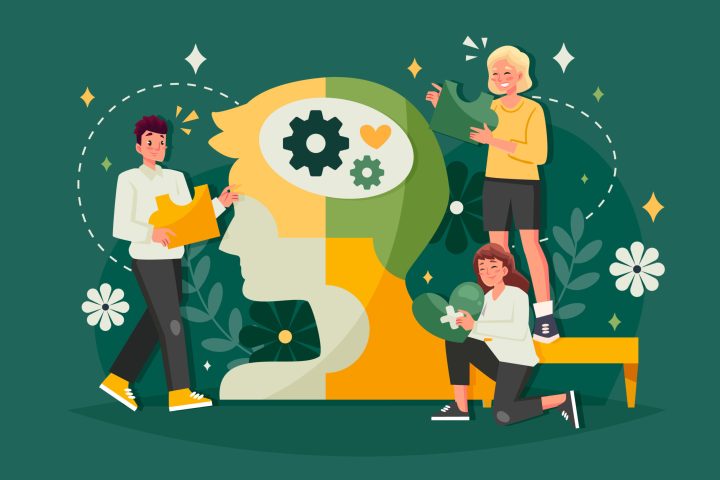Supporting a partner with an eating disorder requires patience and understanding. It’s a challenging journey but necessary for their recovery.
Eating disorders are serious conditions. They can affect anyone, regardless of age, gender, or background. If your partner is struggling, your support can make a big difference. In this blog, we will explore practical ways to help your partner. You will learn how to provide emotional support and encourage positive habits.
This guide aims to give you the tools to be there for your loved one, fostering a healthier relationship and a path to recovery. Let’s start this important journey together.
Topic of Contents
ToggleRecognizing The Signs
Recognizing the signs of an eating disorder is the first step in supporting your partner. Understanding the physical and behavioral indicators can help you identify issues early. This knowledge is crucial for effective support and treatment.
Physical Indicators
Physical changes can be the most obvious signs of an eating disorder. These indicators may include:
- Weight loss or gain: Rapid or extreme changes in weight.
- Fatigue: Constant tiredness or low energy levels.
- Gastrointestinal issues: Frequent stomach pain, constipation, or acid reflux.
- Hair loss: Noticeable thinning or loss of hair.
- Dental problems: Erosion of tooth enamel or sensitivity.
These signs are not always due to an eating disorder. However, they are important to monitor.
Behavioral Changes
Behavioral changes are often more subtle but equally significant. Watch for the following:
- Food rituals: Cutting food into tiny pieces, eating very slowly, or hiding food.
- Skipping meals: Frequently missing meals or making excuses not to eat.
- Excessive exercise: Spending a lot of time exercising, even when tired or injured.
- Social withdrawal: Avoiding social events, especially those involving food.
- Mood swings: Rapid changes in mood, irritability, or depression.
Behavioral changes can be harder to spot. Pay attention to shifts in your partner’s daily habits.
Opening The Conversation
Supporting a partner with an eating disorder requires sensitivity and understanding. The first step is often the hardest: opening the conversation. It’s important to approach this topic thoughtfully and carefully. Below, we provide guidance on how to start this crucial dialogue.
Choosing The Right Time
Timing is everything. Choose a moment when your partner is relaxed and not preoccupied. Avoid bringing up the topic during stressful times. A calm environment helps in having a productive conversation. Ensure you both have enough time to talk without interruptions. This shows that you are serious and considerate about discussing their well-being.
Approaching With Empathy
Empathy is key. Use language that is supportive and non-judgmental. Start with phrases like, “I’ve noticed you’ve been struggling, and I care about you.” This sets a positive tone. Listen more than you speak. Allow your partner to share their feelings. Validate their emotions without offering solutions immediately. Sometimes, just being heard is the most supportive act. Avoid blaming or criticizing. Focus on expressing your concern and willingness to support. Say things like, “I’m here for you,” and “We can get through this together.” This fosters a sense of partnership and trust.
| Do’s | Don’ts |
|---|---|
|
|
By choosing the right time and approaching with empathy, you create a safe space for your partner to open up. This is the first step in supporting them through their journey.
Educating Yourself
Supporting a partner with an eating disorder can be challenging. Educating yourself about these disorders is crucial. Knowledge helps you understand what your partner is facing. It also allows you to provide better support. Let’s explore how you can educate yourself.
Understanding Different Disorders
There are various types of eating disorders. Some common ones include anorexia, bulimia, and binge-eating disorder. Each disorder has unique characteristics. Knowing these differences is essential. It helps you recognize the specific challenges your partner faces. Anorexia involves extreme food restriction. Individuals with anorexia often have a distorted body image. Bulimia includes cycles of binge eating followed by purging. Purging can involve vomiting or using laxatives. Binge-eating disorder involves eating large amounts of food without purging. Understanding these distinctions is the first step in offering support.
Learning About Symptoms
Each disorder has its own set of symptoms. Recognizing these symptoms can help you identify the problem early. For anorexia, look for extreme weight loss and obsession with dieting. People with bulimia may show signs of frequent bathroom trips after meals. They might also have dental issues from vomiting. Binge-eating disorder symptoms include eating in secret and feeling shame after eating. Your partner may also gain weight rapidly. Understanding these symptoms can help you offer better support. It also allows you to encourage your partner to seek professional help.
Offering Emotional Support
Supporting a partner with an eating disorder can be challenging. Offering emotional support is crucial. Your love and understanding can make a big difference. This section will guide you on how to provide the best emotional support.
Listening Actively
Active listening is essential. Pay full attention when your partner speaks. Avoid interrupting or judging. Show that you are there for them. Use nods and affirmations to show engagement. Repeat back what they say to ensure understanding. This builds trust and shows empathy.
Providing Reassurance
Offer constant reassurance. Remind your partner they are not alone. Affirm your love and commitment. Encourage them to seek professional help. Let them know it’s okay to struggle. Your support can be a strong pillar. Simple words of encouragement can mean a lot.
Promoting Healthy Habits
Supporting a partner with an eating disorder requires understanding and patience. Promoting healthy habits is crucial in their recovery journey. This section will guide you on how to encourage balanced nutrition and support regular exercise.
Encouraging Balanced Nutrition
Balanced nutrition plays a key role in recovery. Start by educating yourself on healthy eating patterns. This knowledge helps you provide better support. Prepare meals together. Cooking as a team can make healthy eating fun. It also allows you to introduce nutritious foods in a non-pressuring way. Encourage your partner to eat regular meals. Skipping meals can trigger unhealthy eating behaviors. Praise their efforts and progress. Positive reinforcement boosts their confidence. Avoid focusing on calorie counting. Instead, emphasize the benefits of nourishing the body. Make mealtimes relaxed and enjoyable. This can reduce anxiety around food.
Supporting Regular Exercise
Regular exercise helps improve mental and physical health. Encourage activities that your partner enjoys. This makes it easier for them to stay active. Suggest gentle exercises like walking, yoga, or swimming. These activities are less likely to trigger negative behaviors. Exercise together when possible. This provides support and makes the activity more enjoyable. Avoid pushing them too hard. Respect their limits and be patient. Celebrate small achievements. This can motivate them to continue. Remind your partner that exercise is about feeling good, not just about appearance.
Avoiding Common Mistakes
Supporting a partner with an eating disorder can be challenging. It’s crucial to understand common mistakes to avoid. Missteps can harm their recovery journey. This section will help you navigate these challenges effectively.
Refraining From Judgment
People with eating disorders already feel judged. Avoid making comments about their appearance or eating habits. Negative remarks can increase their stress and anxiety. Instead, offer understanding and compassion. Listen to their feelings without interrupting. Support them without criticism.
Not Forcing Recovery
Recovery is a personal journey. Avoid pushing your partner to get better quickly. Forcing recovery can lead to resistance. Allow them to progress at their own pace. Encourage seeking professional help. Celebrate small achievements along the way. Patience is key in this process.
Seeking Professional Help
Supporting a partner with an eating disorder can be challenging. It’s important to seek professional help to ensure they get the care they need. Professional help provides guidance and tailored treatments that can lead to recovery. Below, we will discuss how to find the right therapist and explore different treatment options.
Finding A Therapist
Start by searching for therapists who specialize in eating disorders. Look for credentials and experience in treating these conditions. You can find therapists through online directories or ask for recommendations from healthcare providers. Ensure the therapist is someone your partner feels comfortable with. It’s essential to check reviews and testimonials. They provide insights into the therapist’s approach and effectiveness. Schedule initial consultations to see if the therapist is a good fit. A good therapist should be compassionate and understanding of your partner’s needs.
Exploring Treatment Options
Eating disorders require a comprehensive treatment plan. This may include therapy, nutrition counseling, and medical care. Therapy options can range from cognitive-behavioral therapy (CBT) to family-based therapy. Choose the one that best suits your partner’s condition and preferences. Nutrition counseling helps in developing healthy eating habits. A registered dietitian can create a meal plan that supports recovery. Medical care is crucial for monitoring physical health. Eating disorders can cause severe health issues, so regular check-ups are necessary. Consider joining support groups. They offer a sense of community and shared experiences. Support groups can be in-person or online. They provide a space where your partner can talk about their struggles and gain encouragement from others who understand.
Creating A Supportive Environment
Supporting a partner with an eating disorder requires a compassionate and understanding approach. Creating a supportive environment is crucial for their recovery. This involves removing potential triggers and encouraging positive activities that can aid in their healing process.
Removing Triggers
Identifying and removing triggers from your home is essential. Triggers can vary, but common ones include diet talk, weight scales, and certain foods.
| Trigger | Action |
|---|---|
| Diet Talk | Avoid discussing diets or body sizes. |
| Weight Scales | Remove or hide weight scales. |
| Certain Foods | Keep trigger foods out of sight. |
Creating a safe space involves mindful conversations. Focus on health and well-being rather than appearance.
Encouraging Positive Activities
Encourage your partner to engage in activities that promote self-esteem and joy. These activities can serve as healthy distractions and boost their mood.
- Exercise Together: Gentle activities like yoga or walking.
- Hobbies: Encourage them to pursue hobbies they love.
- Mindfulness: Practice mindfulness or meditation together.
Positive activities can replace harmful behaviors with healthier habits. Be patient and celebrate small victories. Remember, your support can make a significant difference in their recovery journey.
Taking Care Of Yourself
Supporting a partner with an eating disorder can be challenging. It’s essential to remember that taking care of yourself is crucial. You cannot pour from an empty cup. Prioritizing your well-being helps you stay strong for your partner.
Setting Boundaries
Establish clear boundaries to protect your mental and emotional health. Communicate openly about what you can handle. Setting limits does not mean you love your partner any less. It simply means you are taking care of yourself. Healthy boundaries ensure that you do not get overwhelmed.
Seeking Your Own Support
Find your own support system. Talk to friends, family, or a therapist. Sharing your feelings with someone you trust can be a huge relief. Support groups for partners of those with eating disorders can also be helpful. They offer understanding and practical advice. Remember, you are not alone. Many people face similar challenges. Seeking support is a sign of strength, not weakness. It helps you stay resilient and compassionate.
Frequently Asked Questions
How Can I Support My Partner With An Eating Disorder?
Listen to your partner. Show empathy. Avoid judgment. Encourage professional help. Offer your support consistently.
What Should I Avoid Saying To My Partner?
Avoid comments about their body or eating habits. Refrain from giving unsolicited advice. Do not criticize.
How Can I Encourage My Partner To Seek Help?
Express concern for their health. Suggest professional therapy. Offer to help find resources. Be supportive, not forceful.
What Are Signs My Partner Needs Urgent Help?
Extreme weight loss. Refusal to eat. Severe emotional distress. Physical health decline. Immediate professional intervention needed.
Conclusion
Supporting a partner with an eating disorder requires patience and empathy. Listen actively. Offer your support without judgment. Educate yourself about the disorder. Encourage professional help. Create a safe, nurturing environment. Small steps make a big difference. Celebrate their progress, no matter how small.
Remember, your support can make a crucial impact. Stay positive and consistent. Your love and understanding can help them heal.







